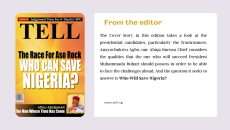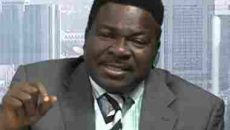
(Published in the Nigerian Tribune on Monday, 13 September, 2021)
President Muhammadu Buhari last week in Imo State acknowledged the resourcefulness and enterprising spirit of Igbo people. He said: “The fundamental thing about the Igbo people is that there is no town you visit in Nigeria without seeing the Igbo being in charge of either infrastructure or the pharmaceutical industry. Therefore, it is unthinkable for me that any Igbo man would consider himself not to be a part of Nigeria. The evidence is there for everyone to see that Igbo are in charge of Nigeria’s economy.” Amazing.
When you water the plant of a nation with the blood of the innocent, and of a section of it, it won't grow healthy – because the soil is cursed. Click To TweetWas it not this same president who said in June – just three months ago – that these same Igbo, because of their beloved Biafra, were “just like a dot in a circle”? You remember he stressed for effects that even if the Igbo managed to exit Nigeria, “they’ll have no access to anywhere.” He suggested strongly that Nigeria would constrict them because there would be no access to the sea. Then he wondered aloud: “And the way they are spread all over the country, having businesses and properties, I don’t think IPOB know what they are talking about. In any case, we say we’ll talk to them in the language that they understand. We’ll organise the police and the military to pursue them.” That was the position of the commander-in-chief three months ago.
Why does Nigeria enjoy slaughtering its golden geese? Why kill them? Click To TweetBut Buhari in Imo State appeared to have changed his opinion of the Igbo man. His tone changed too. What is that thing that has shifted the tectonic plate of the hardliner? An expert said “leaders change their mind for one of three reasons: external forces, new knowledge or spontaneous cognitive shifts.” To which of these reasons does the president owe his new picture of (or posture on) the Igbos? We may not know – but someone told me it could be all three here. What we observe, however, is that our leader spoke as if he no longer saw his Igbo subjects as “just five percent” and as a problem-people fit only for the police and the army to pursue. They are now a prized race who should not leave Nigeria. Did he really mean it or it was just another of the old slithering tricks of the Bayajidda? He said it was “unthinkable” for him “that any Igbo man would consider himself not to be a part of Nigeria.” But the history of Igbo’s ‘hatred’ for Nigeria is an open book; it is forced on them by the same system that has ‘killed’ Nigeria’s reason for existence. My people say Goat never said Sheep was not his sibling. Rather, it is Sheep that insists that his mother had no dark-complexioned child. And goats are born black.
The Igbo man has his failings – like any other man. Having and condoning self-serving leadership is one of his dubious blessings. And, until recently, he thought it was wisdom for his goat to follow every hyena holding palm fronds. That is despite the fact that his experience with Nigeria has been of blood and tears. Across decades, Igbo are flies in the hands of wanton street boys of the north. It started even before independence. On 22 June, 1945, the Jos riots happened. They were the south’s first encounter with violent northern Nigeria. Some historians blamed the riots on the north’s simmering resistance to its amalgamation with the south. Lives and valuable assets were lost there that early in the life of Nigeria. Then there were the Kano riots of 16 May, 1953. They were the north’s response to southern leaders’ call for independence for Nigeria. Fifty-two persons died and 245 injured in the riots. Valuable assets were also lost to looting and arson. From May 1966 to July 1967, there was what historians call the pogrom on the streets of northern Nigeria. Check the thousands of southerners who died in it and the percentage of the Igbo victims in the massacre. Even unborn babies were not spared. Then the civil war started in July 1967 and, for 30 months, it was death and destruction. The respite that followed the end of the war saw the Igbo babe choosing the enemy as her husband – and she enjoyed the honeymoon while it lasted. On October 14, 1991, a German Christian evangelist called Reinhard Bonnke wanted to stage a revivalist rally in Kano. There were riots; about 200 people died and people lost assets. Earlier in April of same year in Bauchi, no fewer than 500 people died in similar riots with rioters setting fire to homes and shops. When the north said it wanted sharia in January 2001, again people died. And between February and December 2002, its way of showing seriousness on the sharia question was killing of southerners. In November 2002 again, there was an attempt to host a Miss World beauty contest in Nigeria. That secular business intention birthed murderous riots in Kaduna; at least 215 persons died. The Guardian of UK described the unrest as “more about old grudges than a beauty contest.” It confirmed that the riots “left deep wounds.” Killing of southerners in the north has ever been as routine as herding of cows by the Fulani. How many people have been tried for these crimes? The murderers always live to kill tomorrow. But then, when you water the plant of a nation with the blood of the innocent, and of a section of it, it won’t grow healthy – because the soil is cursed.
But beyond the platitudes of shifty words of friendship, he must be seen from now on doing justice to all manner of people. Click To TweetReggae legend, Bob Marley, left many songs for all oppressed peoples of the world. He titled a particularly intensely profound one ‘War.’ In that song, Marley sang of justice and injustice and of their consequences. He sang of war and rumours of war. He gave conditions for peace but he also predicted the triumph of good over evil. The lyrics:
“Until the philosophy
Which hold one race superior
And another inferior
Is finally and permanently
Discredited
And abandoned,
Everywhere is war;
Me say war.
That until there are no longer
First class and second class citizens
Of any nation;
Until the colour of a man’s skin
Is of no more significance
Than the colour of his eyes
Me say war;
Until the basic human rights
Are equally guaranteed to all
Without regard to race
It is war…
That until the ignoble
And unhappy regimes
That hold our brothers…
in sub-human bondage
Have been toppled
Utterly destroyed
Well, everywhere is war,
Me say war –
War in the east
War in the west
War up north
War down south
War, war…”






 WhatsApp us
WhatsApp us